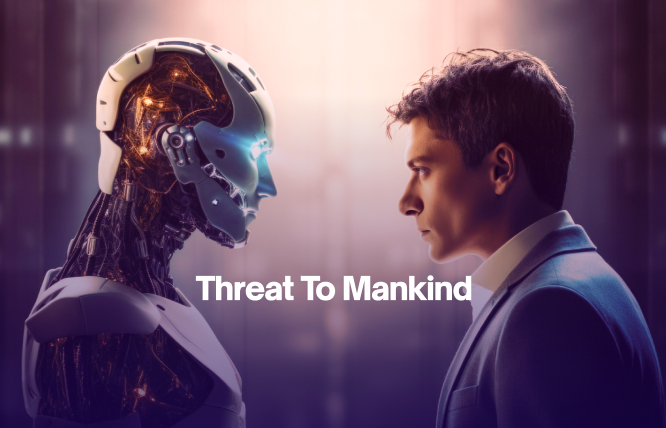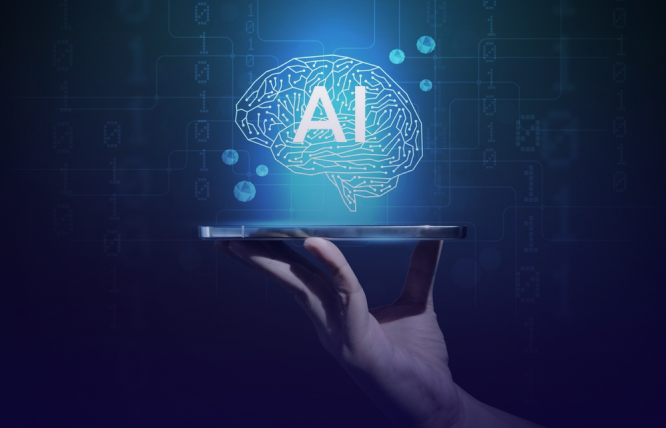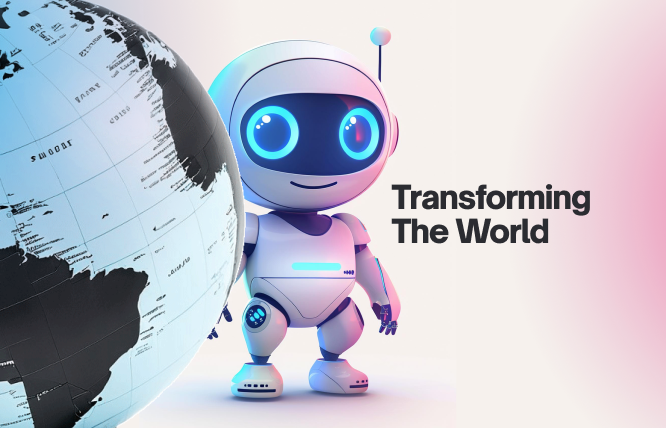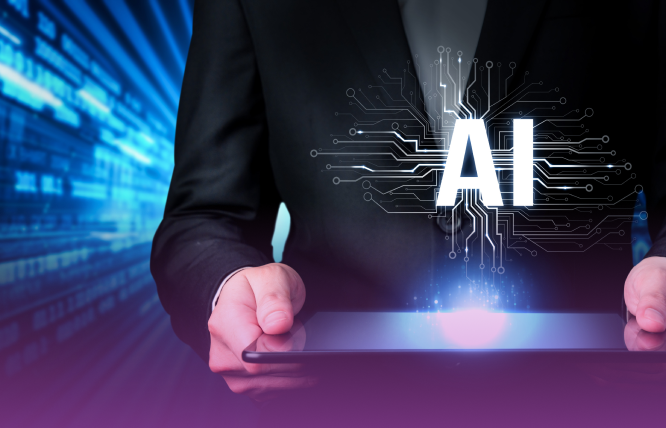Introduction
Is artificial intelligence a threat to mankind? Well, AI offers plenty of potential, but it is also associated with some pressing concerns, such as loss of control, bias, and job displacement. By properly mitigating AI-related risks, you can make excellent use of AI to serve humankind.
We are living in some interesting times where Artificial Intelligence (AI) has witnessed rapid evolution in a rather short amount of time. It has successfully permeated different aspects of our lives. Whether it is personalised recommendations or self-driving cars, the influence of AI is indeed a massive one.
True, it has shown massive potential, but at the same time, it has raised prominent concerns about its influence on humanity. So, if you also have some concerns with regard to AI, then this is a must-read blog for you. It explores areas that are of concern, explore possible threats, and discuss strategies for risk mitigation.
| AI Application | Possible Benefits | Possible Threats |
Law Enforcement | Facial recognition, crime prediction | Privacy violations, wrongful convictions, bias |
Military | Intelligence analysis, autonomous weapons | Arms race, ethical implications, loss of control |
Transportation | Traffic optimisation, autonomous vehicles | Job loss, ethical dilemmas, safety concerns |
Finance | Risk assessment, algorithmic trading, fraud detection | Financial inequality, job displacement, market instability |
Healthcare | Drug discovery, personalised treatment, improved diagnosis | Autonomous decision-making, algorithmic bias, privacy breaches |
Addressing AI-related Concerns
Let’s look at some of the leading concerns regarding AI, which will allow us to answer the following question: “Is artificial intelligence a threat to mankind?”
Job Displacement
A prominent concern regarding AI for a long time has been that it will displace human capital. Since AI has the potential to become highly sophisticated as time passes, it will automate tasks that were once done by experts. Ultimately, this means job losses in various industries. And this means an exacerbation of the already existing social unrest and economic inequalities.
For instance, AI-related advancements are already affecting industries such as customer service, transportation, and manufacturing. Automation of tasks such as customer support and assembly line work can cause significant job losses, especially in repetitive and low-skilled roles. This will have prominent implications for both communities and individuals, as well as for overall economic stability.
We need to invest in training programs and education to help workers acquire new skills that are in demand in an AI-driven economy. Policymakers can introduce support programs and social safety nets to assist people who have suffered job losses due to AI.
Autonomous Weapons
This is perhaps one of the scariest things about AI. The creation and evolution of autonomous weapons that can make life-or-death decisions without human input has raised some big ethical concerns. These weapons can play a big part in conflicts, possibly causing escalation and unintended consequences. Additionally, lack of human accountability will pose massive risks.
Another name for autonomous weapons is the Lethal Autonomous Weapon System (LAWS). These can feature decision-making algorithms, artificial intelligence, and sensors that let them identify targets and engage with them without any human interference. This brings forth questions regarding the overall ethics of such weapons, as they may possibly be used to escalate conflicts or target civilians.
There is need for developing international agreements and regulations that prohibit their use and development. We need more conversations around the ethical implications of these weapons and the possible consequences of their deployment.
Discrimination & Bias
Today’s AI has the potential to be trained on massive datasets, which may feature biases that reflect societal prejudices. These biases can make their way into AI’s decision-making, which means that there is a potential for discrimination against marginalised groups. This is a big concern in aspects like criminal justice, lending, and hiring.
Let’s say that an AI system is trained on huge datasets that may reflect existing societal prejudices or feature biases. This means that such biases can get into a system via data itself, either through the human biases of the developers or the algorithms used to train the models. For instance, there could be a facial recognition system that will showcase less accuracy for people of colour. Besides this, algorithms used for hiring a workforce in an organisation may showcase gender bias.
It is crucial to ensure that the data used to train AI systems is diverse enough and is a good representative of the population. Furthermore, developers must make themselves aware of the possible biases present in their algorithms and take measures to mitigate them.
Accountability and transparency are important to ensure that AI is not used to discriminate against any group.
Loss of Control
Both governments and organisations are heavily investing in AI systems. It comes with a potential risk that they could go beyond what human intelligence can perceive and become uncontrollable. Experts call this the “superintelligence” hypothesis, which has raised prominent concerns regarding humanity’s future. It is important to ensure that AI stays aligned with human values and objectives.
The chance of AI surpassing human intelligence has been expressed by experts from all over the world and has been part of both fiction and literary work. If somehow, AI were to become more intelligent than humans, then it could would make harmful choices against humanity or even cause their extinction – referred to as the ‘existential risk’ of AI and highlights the significance of ensuring that AI stays aligned with humanity’s objectives and values.
It is important to develop protocols to ensure that AI stays firmly under human control. This will involve making use of kill switches, limiting AI’s access to critical systems, and creating clear ethical guidelines for AI development. Furthermore, it is important to harness ongoing development and research in AI safety. This will ensure that humanity is prepared for possible risks.
Risk Mitigation
To ensure that AI is both deployed and developed responsibly, it is important to address the underlying concerns and mitigate the risks.
Let’s look at some important strategies in this regard:
Continuous Monitoring and Evaluation: It is necessary to continuously monitor and evaluate AI systems to identify and address possible risks. This includes assessing AI systems-related performance, conducting regular audits, and updating frameworks and ethical guidelines as required.
Privacy and Data Protection: Safeguarding privacy and data security is important in today’s age. The implementation of robust data protection measures will assist in the prevention of unauthorised access to sensitive information and will ensure the responsible use of AI systems.
Inclusion and Diversity: Promoting inclusion and diversity in AI development and research will ensure that AI systems are not biased against today’s marginalised groups. This is where a diverse team of developers can step in and offer various experiences and perspectives to the development process, assisting in the mitigation of biases and ensuring that an AI system is both fair and equitable.
Human Oversight and Control: The assurance that humans are in control over AI is important to prevent unintended consequences. This includes the creation of mechanisms for human oversight, like emergency stop buttons, and ensuring that AI systems are created to be both explainable and transparent.
Education and Awareness: Creating awareness regarding the possible benefits and risks of AI is vital for better decision-making. Education programs in understanding the importance of responsible development and the implications of AI. Furthermore, public debate and discourse will contribute to a broader understanding of AI-related concerns.
International Cooperation: The establishment of international governance mechanisms and cooperation will aid in the addressing of global challenges associated with AI, such as bias and autonomous weapons. International organisations and agreements can play an important part in offering a framework for collaboration to ensure that AI is both developed and utilised responsibly.
Ethical Guidelines and Frameworks: The development of clear guidelines and frameworks for AI development and utilisation will assist in ensuring that AI systems are in line with human values. Such frameworks can offer a detailed understanding of issues such as privacy, accountability, transparency, and fairness.
Benefits of AI
There are several challenges associated with, but the technology also comes with tremendous benefits. Let’s have a look at some of these benefits in detail to address the question “Is artificial intelligence a threat to mankind?”.
Improved Productivity and Efficiency: AI automates repetitive and time-consuming tasks, so people get time to do the creative work, resulting in higher productivity and efficiency in different industries, from healthcare to manufacturing.
Better Decision-Making: AI can analyse massive data and identify patterns that are either difficult or impossible for humans to detect. This will help both governments and organisations to make accurate and informed decisions. For instance, AI helps in optimising supply chains, predicting customer behaviour, and identifying possible risk factors.
Personalised Experiences: AI offers personalised experiences to consumers. For instance, AI can suggest services, products, or content as per user’s preferences. This will continue to improve customer loyalty and satisfaction.
Advancements in Science and Research: AI has great potential when it comes to advancing scientific research and discovery. For instance, AI can analyse huge amounts of data to identify new trends and patterns and to develop new products, like medicines.
Improved Healthcare: AI can revolutionise healthcare by improving drug discovery, treatment, and diagnosis. AI systems can analyse medical images to detect diseases early and can be used to develop new treatments and drugs.
Concluding Remarks
Is artificial intelligence a threat to mankind? The answer here is a complex one since AI presents immense potential, but it is also associated with serious concerns. If both governments and organisations can understand the associated risks and take proactive steps to mitigate them, AI can change the game for the better!
If you are looking to integrate AI into your business, get in touch with FuturByte. Our expert AI experts and development team will walk you through how AI can facilitate your operations. Schedule a free consultation today.
Frequently Asked Questions
Some of the most frequently talked about challenges of AI include the loss of control, bias, autonomous weapons, and job displacement.
AI can assist in decision-making, improving efficiency, automating tasks, detecting diseases, analysing data, and more.
Have questions or feedback?
Get in touch with us and we‘l get back to you and help as soon as we can!




